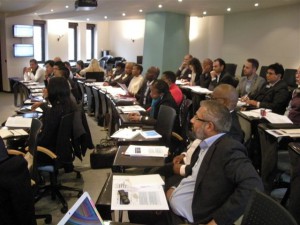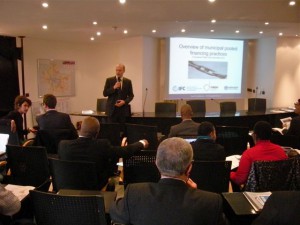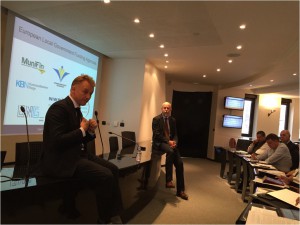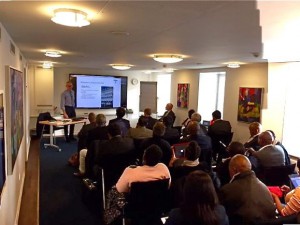 On November 28, an exchange between the Nordic countries and France took place in the premises of the French Ministry of Finance in Bercy, Paris. The initiative to organise this French-Nordic Conference was taken by the Regional Department of Economic Affairs of the French Embassy to Sweden. A number of prominent representatives from both public and private sector shared their views and experiences, including M. Michel Sapin, the French Minster of Economy and Finance, Madame Axelle Lemaire, the French Minister of State for the Digital Sector and Innovation, Mr Olli Rehn, Finnish Minister of Finance, Mr Jakob Wallenberg, Chairman of the Swedish company Investor and many more.
On November 28, an exchange between the Nordic countries and France took place in the premises of the French Ministry of Finance in Bercy, Paris. The initiative to organise this French-Nordic Conference was taken by the Regional Department of Economic Affairs of the French Embassy to Sweden. A number of prominent representatives from both public and private sector shared their views and experiences, including M. Michel Sapin, the French Minster of Economy and Finance, Madame Axelle Lemaire, the French Minister of State for the Digital Sector and Innovation, Mr Olli Rehn, Finnish Minister of Finance, Mr Jakob Wallenberg, Chairman of the Swedish company Investor and many more.
Lars M Andersson was one of the conference’s speakers and appeared in the round table on sustainable cities. He spoke about the close link between the local government funding agencies of Sweden and France, Kommuninvest and Agence France Locale. Here you can read his introduction (in French and below in English):
Mesdames et Messieurs,
 ”C’est dans les villes que la bataille du développement durable sera gagnée … ou perdue si nous échouons.” Je voudrais commencer par citer ces mots de Jan Eliasson, Secrétaire général adjoint des Nations Unies. Ils dépeignent le cadre approprié visant à fournir aux autorités locales – et notamment aux communes – les outils nécessaires pour gagner cette bataille.
”C’est dans les villes que la bataille du développement durable sera gagnée … ou perdue si nous échouons.” Je voudrais commencer par citer ces mots de Jan Eliasson, Secrétaire général adjoint des Nations Unies. Ils dépeignent le cadre approprié visant à fournir aux autorités locales – et notamment aux communes – les outils nécessaires pour gagner cette bataille.
Je vais vous parler d’un cas exceptionnel de coopération franco suédoise, montrant comment les autorités locales nordiques ont inspiré leurs homologues françaises dans l’action.
D’abord un coup d’œil rétrospectif.
La Suède avant 1986 :
Il n’y avait que très peu de concurrence entre les banques pour les crédits aux collectivités locales. Les marges élevées ne pouvaient en aucun cas être justifiées par la situation financière des villes suédoises. En plus, c’était l’époque où les collectivités locales commençaient à ressentir la pression pour réduire leurs coûts tout en maintenant des niveaux significatifs d’investissements dans les infrastructures publiques.
La France avant 2013 :
Les collectivités locales françaises avaient expérimenté une longue période de rétrécissement du crédit, en particulier après les crises financières de 2008-09. En plus, c’était une époque où les investissements dans les infrastructures publiques locales françaises comptaient déjà pour plus de 70 pour cent du total des investissements publics du pays.
Dans les deux cas, les autorités locales se sont réunies et ont discuté ce qu’il fallait faire. La situation était grave, à la fois pour la croissance locale et nationale. Le résultat de ces discussions fut: Unissons-nous! Travaillons ensemble!
Dans le cas de la Suède, l’agence de financement des collectivités locales, Kommuninvest, fut formée en 1986. Immédiatement nous avons réussi à réduire les marges des crédits municipaux par plus de 2 points de pourcentage. Aujourd’hui, plus de 90 pour cent de toutes les autorités locales sont membres de Kommuninvest. Et, l’agence s’est vue attribuer la meilleure notation de S&P et Moody’s. Kommuninvest a, dans un marché libre, sauvé des milliards de couronnes pour les collectivités locales suédoises.
Lorsqu’on constata le besoin de restructurer les moyens de financement des collectivités locales françaises, je fus honoré d’être parmi les conseillers et d’avoir été en mesure de montrer comment nous, en Suède, avions surmonté les défis dans la création, la gouvernance et la gestion de l’agence. Cela fut, bien entendu, ensuite adapté à l’environnement juridique et politique français. Ce processus là conduisit à la création de l’Agence France Locale en 2013. Aujourd’hui, près de 200 collectivités locales en sont les propriétaires. Parmi eux se trouvent presque toutes les grandes villes et agglomérations françaises. L’adhésion est en constante augmentation.
 à l’avenir …
à l’avenir …
Quels sont les défis des collectivités locales et quelles sont les possibilités des agences de financement de faire partie de leur solution ?
Le titre de cette table ronde est « Vers une ville plus verte, durable et inclusive », ce qui bien sûr se réfère à la question du changement climatique. Mais il réfère également à un développement durable social, y compris l’intégration des migrants et la lutte contre la fracture sociale qui existe déjà en France et en Suède.
Une condition préalable à la lutte contre les défis de l’avenir c’est la croissance économique. De plus en plus, nous nous rendons compte que l’austérité n’est pas la bonne route vers plus d’activités économiques. De plus en plus les investissements dans l’infrastructure sont d’une importance cruciale. En France et en Suède, bien plus de 50 pour cent de ces investissements publics sont effectués par des collectivités locales. Cela signifie, selon moi, que les investissements locaux réalisés par les collectivités locales ne peuvent pas être exclus du débat sur la façon d’augmenter la croissance nécessaire.
Ces investissements, sont précisément ceux qui sont financés par l’Agence France Locale et Kommuninvest. Par conséquent, il est très important que les collectivités locales aient les meilleures conditions possibles pour coopérer au sein de ces entités. Les agences ne sont pas des banques comme les autres, elles sont d’abord des outils pour les collectivités locales et également pour l’État central.
Il n’est pas difficile d’arriver à la conclusion que la coopération est le seul moyen de relever les défis de l’avenir. Les agences des collectivités locales, comme Kommuninvest et l’Agence France Locale, peuvent jouer un rôle important, dans des conditions appropriées. Cela peut aussi inciter à d’autres projets de coopération, ce qui est crucial pour le développement de notre société.
Merci
————————————————————
Ladies and Gentlemen,
”Cities are where the battle for sustainable development will be won – or lost if we fail”. I would like to begin by quoting these words of the UN Deputy Secretary General Jan Eliasson. They depict the appropriate framework for providing local authorities – including municipalities – with the necessary tools to win this battle.
I will speak about an exceptional case of Swedish/French cooperation, and about how the Nordic local authorities ended up inspiring their French peers to action.
First, a look back in time…
Sweden before 1986:
There was hardly any competition between banks for local authority credits. The high margins could not by any means be justified by the financial situation in Swedish towns and cities. And this at a time when local authorities began feeling the pressure to reduce costs while still maintaining the levels of infrastructure investments.
France before 2013:
The French local authorities had experiences a long period of credit crunch, especially after the financial crises in 2008-09. And this was at a time when French local authorities’ infrastructure investments counted for more then 70 percent of total French public investments.
In both these cases local authorities came together and discussed what to do. It was a serious situation both for local and national growth. The result of these talks was: Let’s join forces! Let’s work together!
In the Swedish case, the local government funding agency, Kommuninvest, was formed in 1986 and immediately we managed to lower the margins on municipal credits by more then 2 percentage points. Today more then 90 percent of all local authorities are members of Kommuninvest. And the agency is awarded the best credit rating by S6P and Moody’s. Kommuninvest has, in an open market, saved billions for the Swedish local government sector.
When the need in France to restructure the way local authorities were getting credits for local investment occurred, I was honoured to be among the advisors and to be able to show how we solved challenges in the creation, governance and management of the agency in Sweden. This was of course then processed in the French legal and political environment. This led to the creation of Agence France Locale in 2013. Today close to 200 regional and local authorities are the owners. Among them are almost all the major French cities and agglomerations. And, the number increases steadily.
In the future…
What are the challenges of local authorities in France and Sweden and what possibilities have the municipal agencies to be a part of the solution?
The head-line for this round-table is Towards a more sustainable and inclusive city, which of course refers to the question of climate change. But it also points to a social sustainable development including integrating migrants to our society and fight the social divide that already exists both in France and Sweden.
A prerequisite for fighting the challenges of the future is economical growth. More and more have we come to realise that austerity is not the road to more economical activities in our societies. More and more are the infrastructure investments seen as of crucial importance. In both France and Sweden more than 50 percent of these public investments are significantly carried out by regional and local authorities. This means that, according to my opinion, local investments done by local authorities can not be omitted in the debate on how to increase the necessary growth to be able to tackle the challenges of our society.
It is exactly these investments that are financed by Agence France Locale and Kommuninvest. Therefore it is of the outmost interest that local authorities are given the best possible conditions to cooperate within these entities. These agencies are not banks like the others, they are primarily tools for local authorities and also for the central government.
It is not difficult to come to the conclusion that cooperation is the only way to meet the challenges of the future. The municipal owned agencies, like Kommuninvest and Agence France Locale, can play a significant role if given the proper conditions. This can also inspire to other cooperation project crucial to the development of our society.
Thank you













